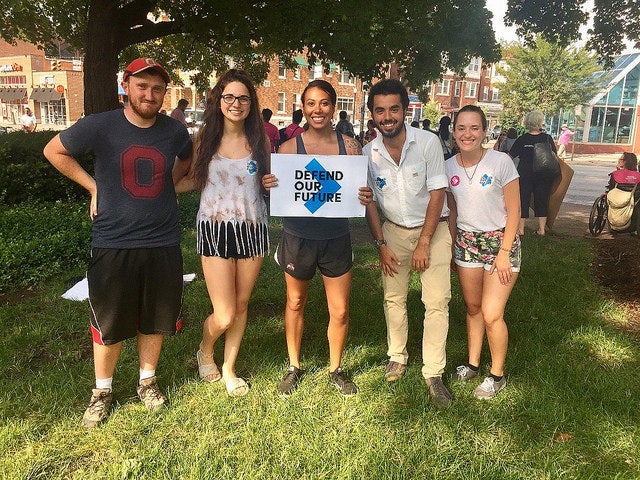May 21, 2020
Contact: Ben Schneider, bschneider@edf.org, 202-572-3279
WASHINGTON, DC (May 21, 2020) Later this morning, May 21, Defend Our Future Campus Ambassador at The Ohio State University Addy Zenko will deliver the following testimony at the Environmental Protection Agency’s Virtual Public Hearing, on their refusal to improve public health protections against dangerous particle, or soot, pollution during the coronavirus pandemic. Air pollution can cause heart and lung disease, which makes coronavirus more deadly. But in the midst of this unprecedented public health crisis, the Trump Administration is rolling back public health protections that keep us safe from air pollution.
WHAT: “Public Hearing on Proposal to Retain the National Ambient Air Quality Standards for Particulate Matter,” an Environmental Protection Agency-organized hearing.
WHO: Addy Zenko, Defend Our Future Campus Ambassador at The Ohio State University
WHEN: Zenko is slated to testify at 10 a.m. ET, May 21. The series of hearings will continue throughout the day, and on May 22 and 27.
WHERE: You can register to watch the virtual hearing here: https://www.epa.gov/pm-pollution/public-hearing-proposal-retain-national-ambient-air-quality-standards-particulate
STATEMENT:
Hello, my name is Addy Zenko and I am a campus ambassador at The Ohio State University for Defend Our Future, a non-partisan, non-profit youth climate advocacy that is a project of the Environmental Defense Fund, who I will be speaking on behalf of this afternoon. As a young person, I am here to voice my support for stronger standards for particulate matter in the United States in order to preserve the health and welfare of millions of Americans for generations to come, specifically those most vulnerable to the adverse effects of poor air quality.
It is no secret that in addition to the litany of grave environmental implications resulting from particle pollution, from damaging sensitive forests and crops to acidifying vital freshwater ecosystems, it also causes asthma attacks, lung cancer, and even premature death. The EPA is proposing to retain, without revision, the existing primary (health-based) and secondary (welfare-based) National Ambient Air Quality Standards (NAAQS) for particulate matter. EPA, both by definition and by law, has a moral and legal obligation to protect all Americans from air pollution that contributes to climate change and damages our health. EPA’s national limits on particle pollution are required to reflect how much of this pollutant is safe to breathe, based on the most innovative and recently available heath science.
However, since air pollution is worsened by the wildfires and erratic storm patterns that result from climate change, our current limits are out of date. This allows inordinately high levels of airborne pollution that put our health on the line to be entirely permissible. By continuing with our particulate matter standards as they are, the EPA would fail to carry out its duty to its constituents and, in turn, would ignore the wishes of the overwhelming majority of Americans who support strong and immediate action to limit the entrance of these harmful pollutants into the lungs of ourselves, our community members, and our children.
Much like COVID-19, the exposure to this airborne pollution unfortunately is exacerbated by old age, asthma, chronic lung or cardiovascular disease, having low socioeconomic status, or belonging to a community of color. As a student at Ohio State, I spend a vast majority of my time nestled in the heart of Franklin County, Ohio, which is home to nearly 300,000 African Americans and received an F rating for high ozone pollution. Studies conducted by the American Lung Association conclude that racial minorities, African Americans in particular, experienced higher risks of harm, including premature death, from exposure to air pollution. In addition to the 300,000 African Americans in Franklin, nearly 74 million people of color live in counties that received at least one failing grade for ozone and/or particle pollution. This essentially means that people in my community are disproportionately exposed to dangerously polluted air, disallowing them from safely partaking in the single most foundational activity to support their own life: breathing. The retention of the existing National Ambient Air Quality Standards would further continue to damage the health and well-being of my fellow Columbus community members and Americans nationwide.
The bottom line is that the air is unhealthy to breathe for over 150 million Americans and counting. People in my community in Columbus, among other communities nationwide, are suffering as a result of the EPA’s refusal to tighten our particulate matter standards to reflect 2020’s pollution levels. On behalf of myself and the overwhelming majority of young people across this country, I urge the EPA to institute stronger PM standards to protect the future of our generation.
-Addy Zenko, Defend Our Future Campus Ambassador at The Ohio State University
###
Defend Our Future, a project of the Environmental Defense Fund, is a non-profit, non-partisan organization dedicated to empowering young people of all political persuasions who are interested in advancing climate change and clean energy solutions that grow our economy and protect the world for future generations. Connect with us on Facebook, Twitter and Instagram.




